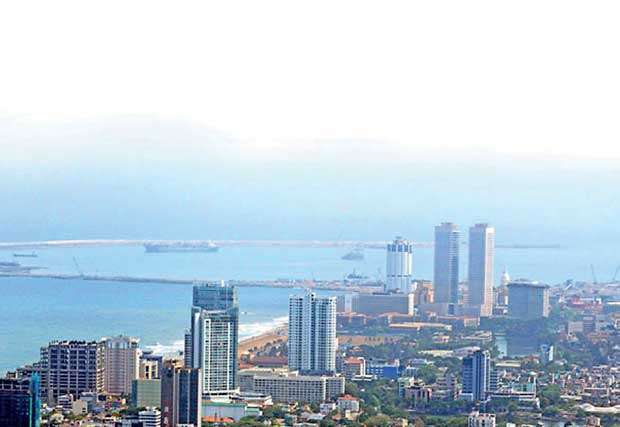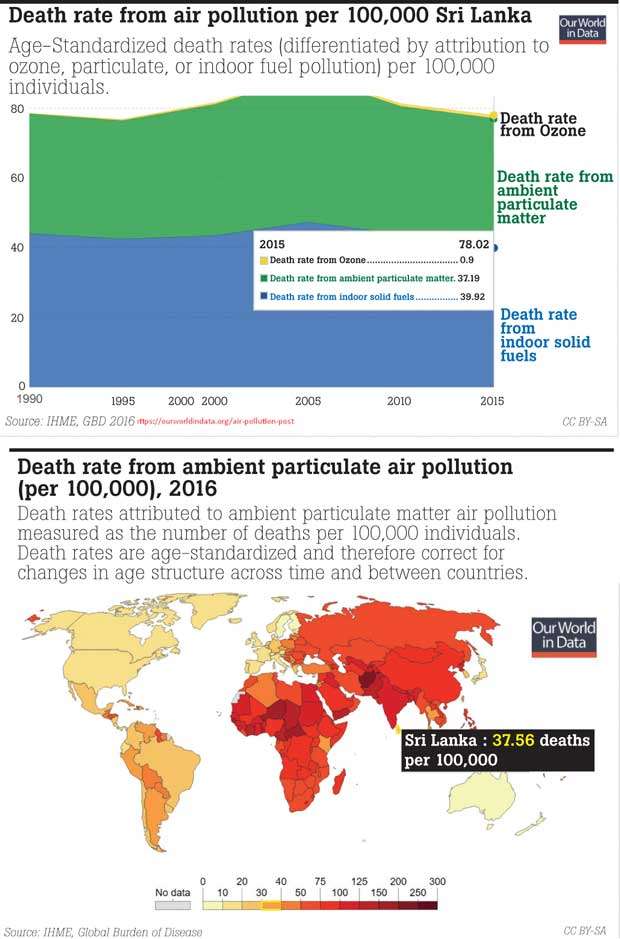29 Jan 2019 - {{hitsCtrl.values.hits}}
Unhealthy levels indicated in Colombo Air Quality Index

 As Colombo is transforming itself into a megapolis, authorities seem to care less about air, noise and other invisible types of pollution that may have adverse impacts on our lives. With more trees being cut down to make space for these mega establishments, nature certainly has no other way to absorb these pollutants that keep contaminating the air. On the other hand, the public too seem to ignore the huge amounts of air and noise pollution they are exposed to on a daily basis. Referring to the Air Quality Index (AQI) monitor, the reading as at yesterday (January 28) stands at 132 which means that the level of air pollution is unhealthy for sensitive groups. Therefore, members of sensitive groups may experience health effects. However, the readings keep fluctuating as the monitor gets updated frequently.
As Colombo is transforming itself into a megapolis, authorities seem to care less about air, noise and other invisible types of pollution that may have adverse impacts on our lives. With more trees being cut down to make space for these mega establishments, nature certainly has no other way to absorb these pollutants that keep contaminating the air. On the other hand, the public too seem to ignore the huge amounts of air and noise pollution they are exposed to on a daily basis. Referring to the Air Quality Index (AQI) monitor, the reading as at yesterday (January 28) stands at 132 which means that the level of air pollution is unhealthy for sensitive groups. Therefore, members of sensitive groups may experience health effects. However, the readings keep fluctuating as the monitor gets updated frequently.
In this backdrop, the Daily Mirror takes a closer look at the World Air Quality Index Project and the situation in Sri Lanka and India.
The World Air Quality Index project
 The World Air Quality Index (AQI) project is a non-profit project which commenced in 2007 with a mission to promote air pollution awareness for citizens and provide unified and worldwide air quality information. The project is proving transparent air quality information for more than 80 countries covering more than 10,000 stations in 1000 major cities. As the AQI increases an increasingly large percentage of the population is likely to experience increasingly adverse health effects. Computation of the AQI requires an air pollutant concentration over a specified averaging period, obtained from an air monitor or a model. Taken together, concentration and time represent the dose of the air pollutant. The AQI can increase due to an increase due to an increase of air emissions such as during rush hour traffic or from a lack of dilution of air pollutants. Stagnant air, often caused by an anticyclone, temperature inversion or low wind speeds lets air pollution to remain in a local area, leading to high concentrations of pollutants.
The World Air Quality Index (AQI) project is a non-profit project which commenced in 2007 with a mission to promote air pollution awareness for citizens and provide unified and worldwide air quality information. The project is proving transparent air quality information for more than 80 countries covering more than 10,000 stations in 1000 major cities. As the AQI increases an increasingly large percentage of the population is likely to experience increasingly adverse health effects. Computation of the AQI requires an air pollutant concentration over a specified averaging period, obtained from an air monitor or a model. Taken together, concentration and time represent the dose of the air pollutant. The AQI can increase due to an increase due to an increase of air emissions such as during rush hour traffic or from a lack of dilution of air pollutants. Stagnant air, often caused by an anticyclone, temperature inversion or low wind speeds lets air pollution to remain in a local area, leading to high concentrations of pollutants.
Managing air quality in Sri Lanka
In Sri Lanka the air quality monitoring unit of the CEA is continuously engaged in monitoring the arrival of air pollutants from other countries. The major functions of this unit include ambient air quality management and environmental noise pollution management. Hence the Unit is involved in the preparation and review of ambient air quality standards, vehicular emission standards, industrial source emission standards, industrial noise standards, vehicle horn noise standards and vibration standards required to control the environmental damage due to air pollution and noise pollution in the country. The Vehicle Emission Testing programme is implemented to control air pollution caused by vehicles and the Unit is also planning to expand its testing facilities to test the quality of fossil fuels since the major sources of air pollution are poor quality fossil fuels used in the transport sector, power generation and industrial activities.

‘People treat invisible pollution as a temporary nuisance’
 With the recent fluctuations in the US Embassy Real Time AQI, a few experts have raised concerns over how this matter needs to be dealt with differently. “Most people treat air and noise pollution as a temporary nuisance,” said Dr. Ranil Senanayake, Chairman of Rainforests Rescue International and Systems ecologist. “Therefore people are not aware that every hour of exposure increase the risk of serious lung damage. Ever since the Urban Development Authority was created we have been calling for the identification and protection of the ‘green areas’ of the city. The irresponsible building of mega-structures that block the air-flow through Colombo demonstrates a total disregard to airflow patterns and public health.
With the recent fluctuations in the US Embassy Real Time AQI, a few experts have raised concerns over how this matter needs to be dealt with differently. “Most people treat air and noise pollution as a temporary nuisance,” said Dr. Ranil Senanayake, Chairman of Rainforests Rescue International and Systems ecologist. “Therefore people are not aware that every hour of exposure increase the risk of serious lung damage. Ever since the Urban Development Authority was created we have been calling for the identification and protection of the ‘green areas’ of the city. The irresponsible building of mega-structures that block the air-flow through Colombo demonstrates a total disregard to airflow patterns and public health.
When asked what were the immediate impacts of this invisible pollution, Dr. Senanayake said that immediately it would manifest as persistent coughs, dizziness, phlegm or mucus discharge. “But as exposure time increases it will lead to conditions such as emphysema, asthma and lung cancer. This process is acute in small children. In terms of precautions the public could be alert on air quality reports and they can remain indoors and refrain from doing strenuous work when the pollution levels are high. It is advisable to wear an air-filter mask when exposing yourself to high road traffic. In fact Colombo is getting increasingly unhealthy as a result of the megapolis projects,” said Dr. Senanayake.
Speaking further he said that there are cheap hand-held devices which could be used to track the level of air pollution. “An example is the portable indoor monitor among other devices. In order to reduce pollution at household level, the public could demand the municipality or local government to set maximum levels of air pollution and legal action could be instituted against perpetrators who exceed the level. You could plant trees and shrubs around your house, include living indoor plants that have a demonstrated capacity for reducing indoor air pollution and install air filtering devices. On the other hand, mega constructions that impede airflow and increase the levels of air pollution should be discouraged.
‘Pollution control measures not economically beneficial’
India has been identified as a country with a high rate of air pollution. In his comments to the Daily Mirror, Dr. Punnen Kurian, an expert in rodent control, eco-friendly pest management, waste management, pollution studies and biodiversity conservation said that there are some rules and regulations in relation to air pollution as per the Air Act of 1972. “However, it is mandatory to carry out an Environmental Impact Assessment (EIA) and follow standard methodologies. But these pollution control measure aren’t taken because they are not economically beneficial for these mega projects. Most of these mega projects contribute to both air and noise pollution, but the authorities hardly notice such activities,” said
Dr. Kurian.
He further said that the methodology required to cut down air pollution depends on the project. “It’s project-specific. The criteria for a tyre company is different to that of an automobile company. However we have come to realise that the general public is not concerned about air pollution. Therefore education is a priority. If they come across a foul smell they would be concerned, but air pollution isn’t visible, so they may not express their concerns. But the long-term risks are huge. In general water pollution is a major issue and they are more concerned about that,” added the doctor.
Refer www.aqicn.org and www.waqi.info to get latest updates on air pollution in your area.
30 Nov 2024 2 hours ago
30 Nov 2024 4 hours ago
30 Nov 2024 5 hours ago
29 Nov 2024 29 Nov 2024
29 Nov 2024 29 Nov 2024